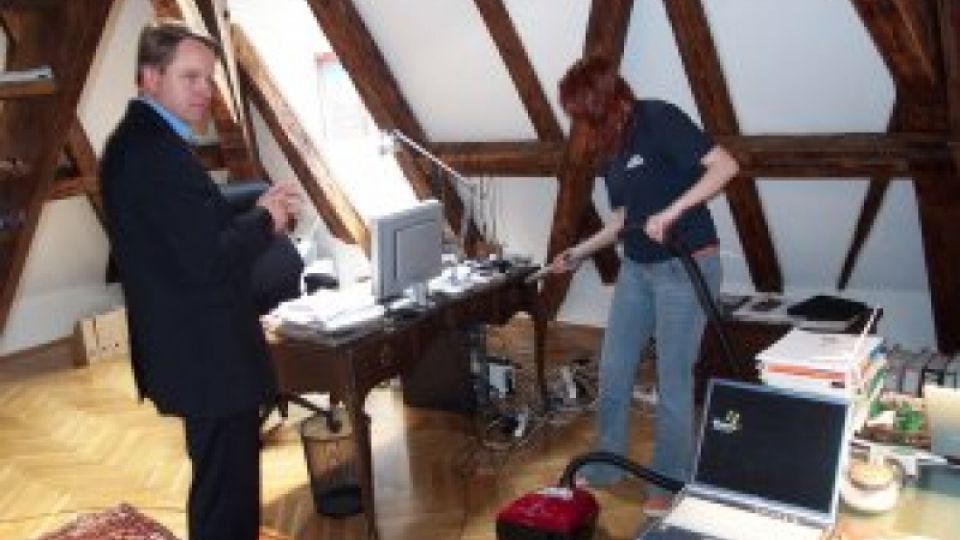A person need not be an employee of a chemical company to expose themselves to toxic substances, you only need to sit in an office. " This has been clearly demonstrated by results of analyses of presence of chemical substances in dust from offices and workplaces in four locations in the Czech Republic. Inadequate control over chemical substances used in various products exposes us to dusts in offices and homes which are dangerous for reproduction or to our immune system, or which accumulate in our tissues and show negative influence on hormonal system. Even in a meteorological observatory in the mountains, you can find high concentrations of the phthalate, DEHP, probably released from PVC flooring, which is a reproductive toxin. We must ask whether this will be changed by the new chemical policy of the European Union - REACH," said chairman of the Arnika Association, Jindrich Petrlík, M.S..
Arnika commissioned analyses of dust and rainwater samples from Churáňov, Ostrava, Prague and Ústí nad Labem for presence of three groups of substances known to have hazardous properties: brominated flame retardants, phthalates and alkyl phenols. Of the 31 analysed substances, the National Reference Laboratory for Persistent Organic Pollutants (POPs) found 18 to 20 of them in the dust samples above the detection limit, and the Laboratory proved presence of 12 to 14 of these substances in the rainwater samples from four locations. "Special attention should be paid to the levels of polybrominated diphenyl ethers, which have been used as flame retardants. Although we still know relatively little about effects of these substances on human health, they are considered immunotoxic, neurotoxic, and they negatively influence liver functioning and the production of hormones. The highest concentrations of these substances were present in samples from Ústí nad Labem. An acid test of REACH will determine whether it will help us to get rid of these unwelcome guests of our workplaces and houses," said Dr. Alan Watson, author of interpretation of the analyses results, published today by Arnika under the name "Danger: Dust".
In Prague, Arnika took samples in the office of the chairman of the Green Party, and candidate for the position of the Minister of the Environment, Martin Bursík, M.S.. In dust from this office, the lowest amount of phthalates was found, perhaps because of his wooden floor rather than the vinyl covery at locations with high level. But it still contained relatively high amount of polybrominated diphenyl ethers. These may have come from computer or from furnishings, and a screening test detected also a chlorinated flame retardant added to paints, plastic coatings, and insulation foams. "Whereas PVC is known to contain phthalates, in the case of various flame retardants little is spoken about their hazardousness and content in products. Thus, I will do my best in my position in order that REACH fill this gap and ensure the consumers the right to information on content of chemical substances in products, and, in particular, ensure substitution of hazardous chemical substances with safer alternatives, where they exist," reacted Martin Bursík, M.S., to results of analyses of dust from his office.
There are no obligatory limits for the analysed substances that must be met. Therefore it was impossible to compare detected levels with such limits. ”However, we see as a problem even the presence of such chemicals in the dust and rain water” said Petrlík.
Also on the basis of results of analysis of dust and rainwater samples, Arnika, together with other European environmental and consumer organisations, will push the Members of the European Parliament to provisions into the REACH regulation during the second reading:
1) Obligation of substitution of hazardous chemical substances where possible;
2) A requirement for companies to provide, and a right of the public to access, information on content of hazardous chemical substances in products including availability of information on their effects on human health and the environment;
3) An obligation to guarantee the chemical safety of products from the industry;
4) Transparency and availability of information, not restricted under the pretext of "trade secret", which would be very limited. At the moment for example the bromine industry produce no publicly available information on even the quantities of products produced in Europe since 2001.
"All our requirements are in agreement with the petition Toxics Free Future II, signed by over 14 thousand people, including Martin Bursík. We hope that this time their wish will be supported by all the Czech Members of the European Parliament," said Petrlík.







